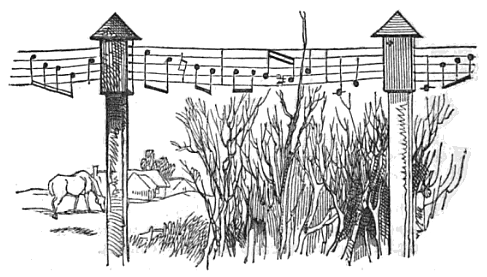
— Frederick W. Umminger Jr., Yale Record, 1959

— Frederick W. Umminger Jr., Yale Record, 1959

I pass on to Eclipses. When the Moon (see above) gets between the Earth (see below) and the Sun (do what you like), the resulting phenomenon is called an Eclipse of the Sun. When the Sun gets between the Earth and the Moon there will be the devil to pay. It will be called the Eclipse of the Earth and is likely to be total.
— H.F. Ellis, So This Is Science!, 1932

At a dinner party, René Descartes’ wife posts him next to the shrimp table and tells him not to let the guests eat until an hour after midnight. When a guest reaches for a shrimp, Descartes stops him and says, “I think they’re for 1 a.m.”
René Descartes is sitting in a bar. The bartender asks him if he’d like another drink. He says, “I think not” — and vanishes.
“I think, therefore Descartes is.” — Saul Steinberg
There was a young student called Fred
Who was questioned on Descartes and said:
“It’s perfect clear
That I’m not really here,
For I haven’t a thought in my head.”
— V.R. Ormerod
In 1988 German artist Rosemarie Trockel offered a 210 x 160-centimeter linen panel on which the words cogito ergo sum had been knitted — by machine.

As telegraph lines began to appear along London’s railroads, they came to fascinate commuters. One wrote to the Illustrated London News to suggest that cornet lessons might now be given on the moving train.
“The medium of tuition will be the wires of the electric telegraph. On these, being five, notes will be fastened by non-conducting materials, and the pupils will play them as they travel. The andante movements will be placed close to the stations, where progress is slow, and the tunes will be so arranged as to finish at all the stoppages. These will be constantly changed, to extend the benefit to all classes: for instance, galoppes will be chosen for the express trains; sets of quadrilles for the stopping ones; and marches, or dirges, for the luggage trains. At the same time, the passengers, generally, will be diverted with agreeable harmony.”
Another commuter responded: “The great objection is, that the notes once passed could never be taken up again, and especially the high ones; for, before the pupil could get his lips to the necessary embouchure, he would be a mile beyond the bar. A non-musical friend, given to senseless ribaldry, suggests that fugues should be chosen for the music; because, as he says, those compositions never appear to have beginning, end, middle, or anything else, and may be commenced or left of anywhere with equal effect.”
He adds, “It would be better, sir, for you to confine yourself to practical improvements than ingenious but futile schemes. … After my entertainments given in the country, I am usually asked to supper by certain of the leading inhabitants, in gratitude for the amusement I have afforded them; and, from drinking healths, I rise next morning with a dizziness. And then, on my return to town, are the wires of the electric telegraph most dreadful. They go up and down, down and up, for miles and miles, until at last, seeing nothing else, I begin to think that they are stationary, and it is the carriage which is undulating; and this has such an effect, that I am as indisposed upon arriving at the terminus as if I had just crossed the Channel. A little care on the part of the directors can remedy this. Why cannot the wires be turned upright, like those of a piano?”
When Einstein was traveling to lecture in Spain,
He questioned a conductor again and again:
“It may be a while,”
He asked with a smile,
“But when does Madrid reach this train?”
A letter from “J. A. McM.,” West Lynn, Mass., to Mark Twain, April 17, 1907:
Dear Sir:–
Apropos of your very entertaining little book on ‘English as she is Taught’ — the following true story fits in well — A teacher asked her class of boys to tell the difference between herself and a clock. A bright little urchin in the rear row raised his hand and said — ‘You have a face and the clock has a face, and you have got hands and the clock has got hands, and — and (reflecting) the clock has got a pendooleum and you aint.’
On the envelope Twain wrote, “Preserve this. Frame it. It is the second time in 40 years that a stranger has done me a courtesy & charged me nothing for it.”
Robert Benchley’s favorite joke, according to Harpo Marx in Harpo Speaks!, 1961:
A man gets on the train with his little boy, and gives the conductor only one ticket. ‘How old’s your kid?’ the conductor says, and the father says he’s four years old. ‘He looks at least twelve to me,’ says the conductor, and the father says, ‘Can I help it if he worries?’
An Englishman buys a horse and hires porters to take the horse up to his apartment on the fourth floor. The porters exert themselves and sweat. Finally they succeed in getting the horse to his apartment.
He asks them to put the horse in the bathtub.
After they finish the job, one of the porters asks him, “Why do you need a horse in the bathtub?”
The Englishman says, “Well, tomorrow evening I’m having a party at home. One of the guests will go into the bathroom, see the horse, come to me and say, ‘You know you have a horse in your bathtub.’ And I’ll tell him, ‘So what?'”
— Sion Rubi, Intelligent Jokes, 2004

In 1972 Canadian scientists R.W. Sheldon and S.R. Kerr set out to reason out the number of monsters that occupy Loch Ness. Because the creatures are reportedly large and rarely seen, it follows that their numbers must be small. (“It has been suggested from time to time that as the monsters are never caught it must therefore follow that they do not exist. This is both irresponsible and illogical.”)
By estimating the fish stock available in the loch, they determined that the total mass of monsters is between 3,135 and 15,675 kg. Taking the minimum monster size as 100 kg (“anything smaller is not suitably monstrous”), they estimate that the loch contains between 1 and 156 monsters. The high end of this range seems unlikely; and since monsters have been reported for centuries they’re probably breeding, which would require a population of at least 10.
Given the available quantity of fish and assuming a stable population, monsters weighing 100 kg would have to die at a rate of at least 3 per year. Larger animals would die less frequently, and this seems likely since dead monsters are never found (and since the juveniles that must replace them are never seen). So it seems the lake probably contains a small number of large monsters, perhaps 10-20 monsters weighing up to 1,500 kg each and measuring about 8 meters, “a size that agrees well with observational data.”
“We would like to thank Kate Kranck for drawing our attention to this problem, because until she mentioned it we were unaware that monsters were a problem.”
(“The Population Density of Monsters in Loch Ness,” Limnology and Oceanography 17:5, 796–798)
Facilities suggested by Lewis Carroll for a school of mathematics at Oxford, 1868:
He introduced this topic with an administrator by writing, “Dear Senior Censor,–In a desultory conversation on a point connected with the dinner at our high table, you incidentally remarked to me that lobster-sauce, ‘though a necessary adjunct to turbot, was not entirely wholesome.’ It is entirely unwholesome. I never ask for it without reluctance: I never take a second spoonful without a feeling of apprehension on the subject of possible nightmare. This naturally brings me to the subject of Mathematics …”